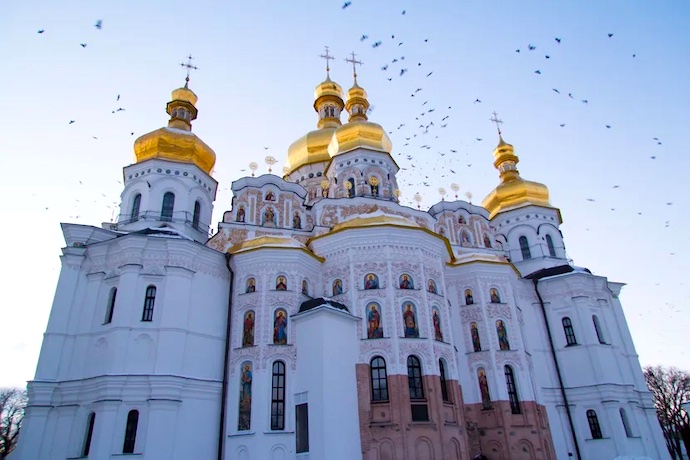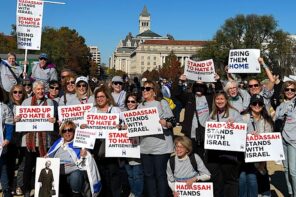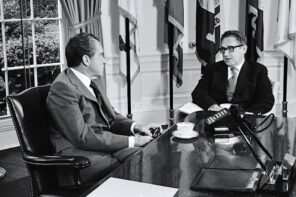Last week, Ukrainian President Volodymyr Zelenskyy called for “targeted closures” of “Moscow-backed” religious organizations in Ukraine, a more polite way of saying that he wants effectively to ban the Russian Orthodox Church. To be clear, the decree signed by Zelenskyy doesn’t immediately close all parishes and monasteries tied to Moscow (an act that would cause widespread chaos in a country where such parishes and monasteries still account for a majority of Orthodox institutions), but it does open all of them up to potential closure.
This comes on the heels of a raid by Ukrainian officials on the 1,000-year-old Kyiv Monastery of the Caves under suspicion that the UNESCO World Heritage site, which remains under the authority of the Patriarchate of Moscow, is being used as a base for Russian intelligence and military operations. Ukrainian security forces are calling it a success, claiming to have found cash in various currencies, Russian propaganda, and “dubious” Russian citizens inside the monastery—you know, the stuff you’re likely to find in a center for espionage.
The raid was the most recent and visible example of a growing concern that the Russian Orthodox Church is operating as more than an instrument of soft power for the Putin-regime, but might actually be involved in subordinating Russian counter-intelligence activities. Though this sounds like a paranoid, dystopian delusion, it’s not without evidence.
In Norway, the Russian Orthodox Church has been buying property with unnerving proximity to key military installations since 2016. It was also in 2016 that the Russian Orthodox Church opened its “spiritual center” in the heart of Paris, which is widely suspected of serving as a base for Russian intelligence. And in Finland, where the Orthodox Church of Finland (an autonomous church under the authority of the Patriarchate of Constantinople) enjoys the status of being one of two national churches, there are whispers that a church under the jurisdiction of Moscow was recently turned into a “listening post” for Russian intelligence.
It shouldn’t be shocking that the Russian Orthodox Church might be acting in tandem with Russian intelligence services; even during the Soviet-era such collaboration was well documented. But such a collaboration does raise serious issues and concerns, not the least of which: How should foreign governments balance the religious freedom of ordinary Russian Orthodox believers with the very real security threat the hierarchy of the Russian Orthodox Church seems to pose? Is a ban, like the one now proposed by Zelenskyy, the only way to guard against such security threats?
It’s a question without easy answers. There are real and growing divisions in the Orthodox world. Broadly speaking, the central division runs between a Western-facing, relatively progressive faction led by the Patriarchate of Constantinople and a Slavophile, reactionary party led by the Patriarchate of Moscow. Technically, the Patriarchates of Constantinople and Moscow haven’t been in full communion with one another since October of 2018 when Moscow unilaterally broke ties with the Greek Patriarch over his decision to grant independence to the Orthodox Church of Ukraine.
Notably, however, just like the Great Schism which divided Rome and Constantinople into the Catholic and Orthodox churches more than a millennium ago, this battle between bishops didn’t necessarily affect the lives of rank-and-file believers. That is until last March when Russian troops began to pour into Ukraine and it became increasingly clear that Patriarch Kirill would act as a cheerleader for Vladimir Putin and his fratricidal war. It became hard not to choose a side.
And while Orthodox canon law in theory allows there to be only one bishop in any geographic location—thereby precluding any real decision-making on the part of ordinary people—over the past century in particular, it has become increasingly common for this ancient order to be violated. In non-traditionally Orthodox countries, such as the United States, this is largely because the Orthodox community is the result of immigration, which has created a patchwork of parishes under different bishops founded when new arrivals “sent home” for a priest. And in traditionally Orthodox places, such as Ukraine, Finland, and Estonia, turf wars (ordinarily between Constantinople and Moscow) are evidenced by the presence of overlapping ecclesiastical jurisdictions.
The consequence of both of these realities is that an ordinary Orthodox Christian in many parts of the world can now choose whether to attend a parish under one hierarch or another—and they have good reason to make such a choice. In fact, the choice of jurisdiction has become as much an act of personal conviction and self-definition as choosing between Orthodoxy and Catholicism.
This makes it hard to argue that actions that limit or ban the activities of the Russian Orthodox Church in light of its connection to the Russian state aren’t limiting the religious freedom of Russian Orthodox believers. After all, it’s not like they can “just go” to another Orthodox church—under Constantinople or Bucharest, for example—because at this point one could argue that these are two separate (or at least separating) faith communities.
Zelenskyy’s call is the most high profile moment for this conundrum thus far. Though it should be noted that lawmakers in Ukraine have proposed banning the activities of the Moscow-backed Ukrainian Orthodox Church (UOC) multiple times before. The Ukrainian president’s position isn’t necessarily that unpopular in his country.
Implicit in this ban is the suggestion that all the Orthodox faithful in Ukraine should be part of the Constantinople-backed Orthodox Church of Ukraine (OCU). But the choice between the UOC and OCU isn’t a neutral one, and banning the Moscow-backed UOC, despite the very convincing national security reasons to do so, is unquestionably placing a limit on religious freedom in Ukraine. Which in theory should be a problem for a country that, seemingly as part of its national security strategy, is increasingly positioning itself on the world stage as dedicated to liberalism and pluralism.
The easiest answer to this problem is to say that the Russian Orthodox Church deserves to be banned if it’s operating as a spy network for Putin; that no one has the freedom to attend a church that’s acting as a front for foreign agents. But that kind of stridency dismisses the complexities of old, complex institutions like the Russian Orthodox Church and individuals’ attachments to them.
It also, whether we like it or not, feeds the propaganda machine that Putin and his Patriarch rely on. They’ve justified the invasion of Ukraine by declaring themselves a persecuted remnant fighting for truth, morality, and Real Christianity™ against a decadent West that’s bent on the destruction of the righteous. What better way to prove them right than to start closing Russian parishes and sending away Russian priests. And let’s not forget, President Zelensky is Jewish, making him the perfect anti-Christian villain for the deeply antisemitic pro-Russian base. Even if a ban is the expedient thing to do, it feeds the paranoia in too many ways.
Perhaps at this point the only way forward that respects the demands of liberal democracy and pluralism and doesn’t give Putin more fodder for his propaganda blitz are safeguards that fall short of a ban. We actually do have a model for this in the involvement of security forces with mosques in the early 2000s. To be clear, some of these efforts went very wrong, hindered by the very real forces of racism, xenophobia, and Islamophobia.
But when these efforts went right—they went really right. The efforts that went right largely involved law enforcement working with community members to identify and act on subversive behavior in their own communities. Because, spoiler alert: The vast majority of ordinary people don’t like their churches, mosques, and synagogues being commandeered for military purposes.
We can do the same in Russian Orthodox communities all around the world, not just in Ukraine. And it can make a difference. This is the only way available to us right now that both protects religious freedom and safeguards against the influence of any Bond villains in clerical clothing. It’s worth a try.





